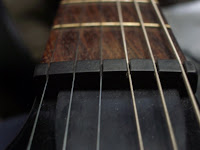
Graph Tech Ferra - Glide Saddles and similar products - Breaking strings often?
You are not alone if you break strings as it is a natural occurrence for guitar players. However, this problem can be limited and I will try to outline a remedy for this situation. But first, there are a series of questions to ask yourself in order to properly assess the situation at hand.
How old are my strings?
Do they break in the same location each time?
Old strings wear at the terminal nodes - called the nut and the bridge. At these points of contact a great deal of vibration affects the string, ultimately wearing the string material and weakening the substrate.
String breakage at these points is dependent on the following influences: amount of friction, applied force, material hardness, string tension, time, and string scale. Without doubt, I probably missed a few attributes but nonetheless those are the prevalent models of effects. String breakage occurring at the same point of contact usually is a friction issue.
One point of contact where friction is dominate is the bridge saddle. The first thing one can do is swap the saddle with an opposing saddle from another string - I chose a string on the bass side (Warning - doing this will require setting your intonation or marking your saddle position before removing). For my case, this made zero difference and I was still breaking strings (Fender American Deluxe Stratocaster with tremolo). I tried to polish metal saddles using a Dremel tool with a fine brush, being careful so not to distort the saddle shape then I used a cotton Dremel tip to achieve a final fine finish. The string breakage decreased in frequency but string breakage occurred in less than a week (I took care to not be hard on them during the test period) but ultimately the problem remained unsolved. For me, I had to fix the problem quickly because I needed the instrument to work properly in a short amount of time. Now I had run several experiments and though I gained valuable information, the problem remained unsolved.
Enter Graph Tech. This company provided a solution -
Ferra-Glide saddles. These units intrigued me and I ordered one set for my Fender
Stratocaster. Installation was simple as I ascertained the proper saddle needed for my model; note YOUR preferred string height and if you do not know how to
intonate your guitar you should also NOTE THE SADDLE LOCATIONS - FORE AND AFT. Install and tune. A month later my strings were dead as can be but still in one piece. This product is a simple cost effective solution to premature string breakage.
In addition, I found that the material used for the contact point of the saddle seemed to improve sustain and clarity of my guitars. Harmonic output was unaffected and the tone is more detailed. The lack of premature breakage inspired new confidence in my guitar. A worry I had was that my tone would sound thicker or muddy but this was not the case. Also, the units are self-lubricating due to the nature of the material. Do I like them and recommend them? Yes, I bought a second set for my PRS Customer 24 that was also exhibiting premature string breakage at the saddle terminal node. Two thumbs up!!
These saddles are worth the cost and so far have been in use on my guitars for over five years now and therefore all this data is gleaned from real world abuse and constant testing by yours truly. I've worked with
PTFE products for many years, I am pleased that the saddles are holding up but real world experience will tell me that some time in the future I will need to replace these units (
PTFE will deform under load, i.e, creep) and therefore I always recommend - DO NOT THROW AWAY YOUR ORIGINAL PARTS post upgrading. Collectors are very particular and if your guitar becomes collectible you will have lost a great deal of value by throwing your old parts in the trash!
Keep in mind that we all must change our strings regularly. If you are playing four hours a day then replacing strings daily would not be unusual. Playing an hour a day might require once a week replacement. All of this is subjective to the user and therefore an acquired preference. I met an old Delta player who quipped that his strings were older than some of his grand-kids! It's all good! Maybe you too need to upgrade to new Ferra-glide saddles or like products to make your time on the instrument more enjoyable?!








